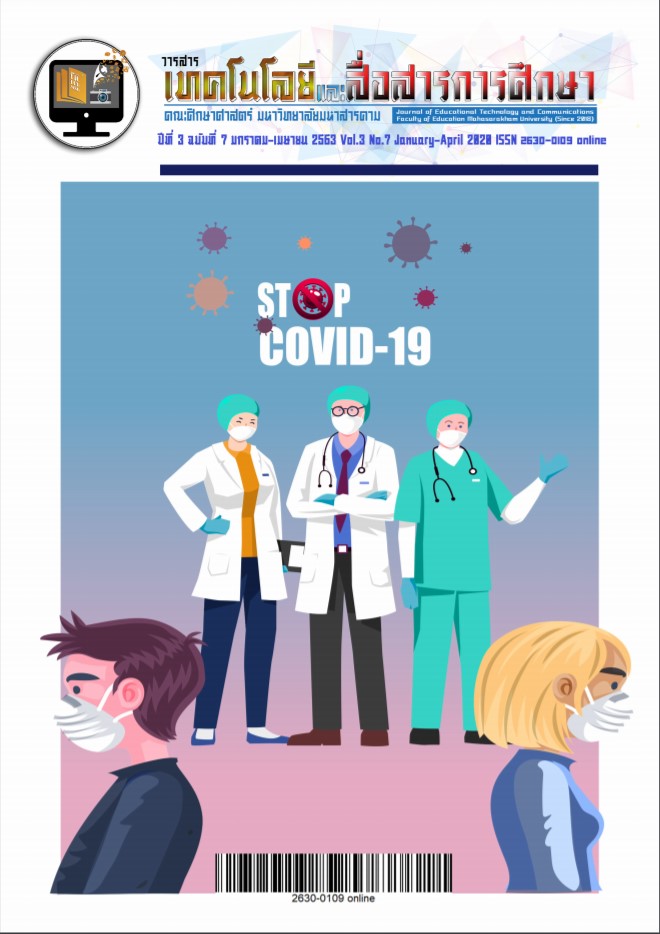การจัดประสบการณ์การเรียนรู้โดยใช้ชุดเกมการศึกษา เพื่อส่งเสริมพัฒนาการด้านสติปัญญา สำหรับเด็กชั้นอนุบาลปีที่ 3
Main Article Content
บทคัดย่อ
การศึกษาครั้งนี้มีวัตถุประสงค์1) เพื่อหาประสิทธิภาพของการจัดประสบการณ์การเรียนรู้โดยใช้ชุดเกมการศึกษา ตามเกณฑ์ 80/80 2) เพื่อเปรียบเทียบพัฒนาการด้านสติปัญญาของเด็กชั้นอนุบาลปีที่3 ก่อนและหลังการจัดประสบการณ์การเรียนรู้โดยใช้ชุดเกมการศึกษา 3) เพื่อศึกษาดัชนีประสิทธิผลของการจัดประสบการณ์การเรียนรู้โดยใช้ชุดเกมการศึกษา และ 4) เพื่อศึกษาความพึงพอใจของเด็กชั้นอนุบาลปีที่ 3 ที่มีต่อการจัดประสบการณ์การเรียนรู้ โดยใช้ชุดเกมการศึกษา กลุ่มตัวอย่างที่ใช้ในการศึกษาครั้งนี้คือเด็กชั้นอนุบาลปีที่3/5โรงเรียนเทศบาล ๓ (วิมุกตายนวิทยา) สำนักการศึกษา เทศบาลเมืองสุไหงโก-ลก อำเภอสุไหงโก-ลก จังหวัดนราธิวาส ภาคเรียนที่ 1 ปีการศึกษา 2560 จำนวน 23 คน ซึ่งได้มาโดยการสุ่มแบบแบ่งกลุ่ม (Cluster Random Sampling) เครื่องมือที่ใช้ในการศึกษาประกอบด้วย 1) ชุดเกมการศึกษา จำนวน 6 ชุด 2) แผนการจัดประสบการณ์จำนวน 36 แผน 3) แบบประเมินพัฒนาการด้านสติปัญญาจำนวน 6 ชุด และ 4) แบบสอบถามความพึงพอใจ จำนวน 1 ชุด วิเคราะห์ข้อมูลด้วยการหาค่าเฉลี่ยค่าส่วนเบี่ยงเบนมาตรฐาน ค่าร้อยละวิเคราะห์ความแตกต่างโดยใช้t-test (DependentSamples)และค่าดัชนีประสิทธิผล
ผลการศึกษาพบว่า
1. ประสิทธิภาพของการจัดประสบการณ์การเรียนรู้โดยใช้ชุดเกมการศึกษา มีค่าประสิทธิภาพเท่ากับ 83.12/84.06 เป็นไปตามเกณฑ์ 80/80 ที่ตั้งไว้
2. พัฒนาการด้านสติปัญญาของเด็กชั้นอนุบาลปีที่ 3 หลังการจัดประสบการณ์การเรียนรู้โดยใช้ชุดเกมการศึกษา สูงกว่าก่อนการจัดประสบการณ์การเรียนรู้อย่างมีนัยสำคัญทางสถิติที่ระดับ .01
3. ค่าดัชนีประสิทธิผลของการจัดประสบการณ์เรียนรู้โดยใช้ชุดเกมการศึกษา มีค่าเท่ากับ 0.6573 แสดงว่าจากการจัดประสบการณ์การเรียนรู้โดยใช้ชุดเกมการศึกษา มีความก้าวหน้าด้านสติปัญญา เพิ่มขึ้น 0.6573 หรือคิดเป็นร้อยละ 65.73
4.ความพึงพอใจของเด็กชั้นอนุบาลปีที่3 ที่มีต่อการจัดประสบการณ์การเรียนรู้โดยใช้ชุดเกมการศึกษาในภาพรวมมีความพึงพอใจอยู่ในระดับมาก ( = 2.73, S.D. = 0.44)
Downloads
Article Details
เอกสารอ้างอิง
กนกกานต์ อยู่สุข, 2553. การพัฒนายุคเกมการศึกษา เพื่อส่งเสริมความสามารถด้านสติปัญญา สำหรับเด็กปฐมวัย การศึกษาค้นคว้าด้วยตนเอง ปริญญาการศึกษามหาบัณฑิต สาขาวิชาวิจัยและพัฒนาการศึกษา บัณฑิตวิทยาลัยมหาวิทยาลัยนเรศวร.
ฉัตรมงคล สวนกัน. (2553). การพัฒนาทักษะการคิดวิเคราะห์ของเด็กปฐมวัยโดยการจัดประสบการณ์ด้วยเกมการศึกษา.
เบญญาดา ปันบุตร. (2558). การพัฒนาแบบฝึกการเตรียมความพร้อมด้านสติปัญญา นักเรียนชั้นอนุบาลปีที่ 1 โรงเรียนสังวาลย์วิทย์ 1. บึงกาฬ: โรงเรียนสังวาลย์วิทย์ 1.
ยามีล๊ะ จะปะกิยา. (2551). การพัฒนาการคิดเชิงเหตุผลของนักเรียน ชั้นอนุบาลปีที่ 2/3 โดยใช้กิจกรรมเกมการศึกษา.
ยุพิน แสงบุดดี. (2559). รายงานการพัฒนาเกมการศึกษาเพื่อส่งเสริมพัฒนาการด้านสติปัญญา สำหรับเด็กชั้นอนุบาลปีที่ 1. พิษณุโลก: โรงเรียนบ้านนายางโกลน.
ลักขณา สริวัฒน์. (2550). สุขวิทยาจตและการปรับตัว. กรุงเทพฯ: โอเดียนสโตร์.
ลักคะณา เสโนฤทธิ์. (2551). ผลการจัดกิจกรรมเกมการศึกษาที่มีต่อพฤติกรรมทางสังคมของเด็กปฐมวัย.ปริญญานิพนธ์การศึกษามหาบัณฑิต สาขาวิชาการศึกษาปฐมวัย บัณฑิตวิทยาลัย มหาวิทยาลัย ศรีนครินทรวิโรฒ.
สำนักงานคณะกรรมการการศึกษาแห่งชาติ, 2553, พระราชบัณญัติการศึกษาแห่งชาติ พ.ศ. 2542 แก้ไขเพิ่มเติม (ฉบับที่ 2) พ.ศ. 2545 และ (ฉบับที่ 3) พ.ศ. 2553, กรุงเทพฯ สำนักงานคณะกรรมการการศึกษาแห่งชาติ .สำนักวิชาการและมาตรฐานการศึกษา. กระทรวงศึกษาธิการ. (2551). หลักสูตรการศึกษาปฐมวัย พ.ศ.2546. กรุงเทพฯ : โรงพิมพ์สกสค. ลาดพร้าว.
________. (2551). คู่มือหลักสูตรการศึกษาปฐมวัย พ.ศ.2546 (สำหรับเด็กอายุ 3-5 ปี). กรุงเทพฯ : โรงพิมพ์ สกสค. ลาดพร้าว.
Hilgard E R & Bower G H. Theories of learning. Englewood Cliffs, NJ: Prentice-Hall, 1975. 698 p.


